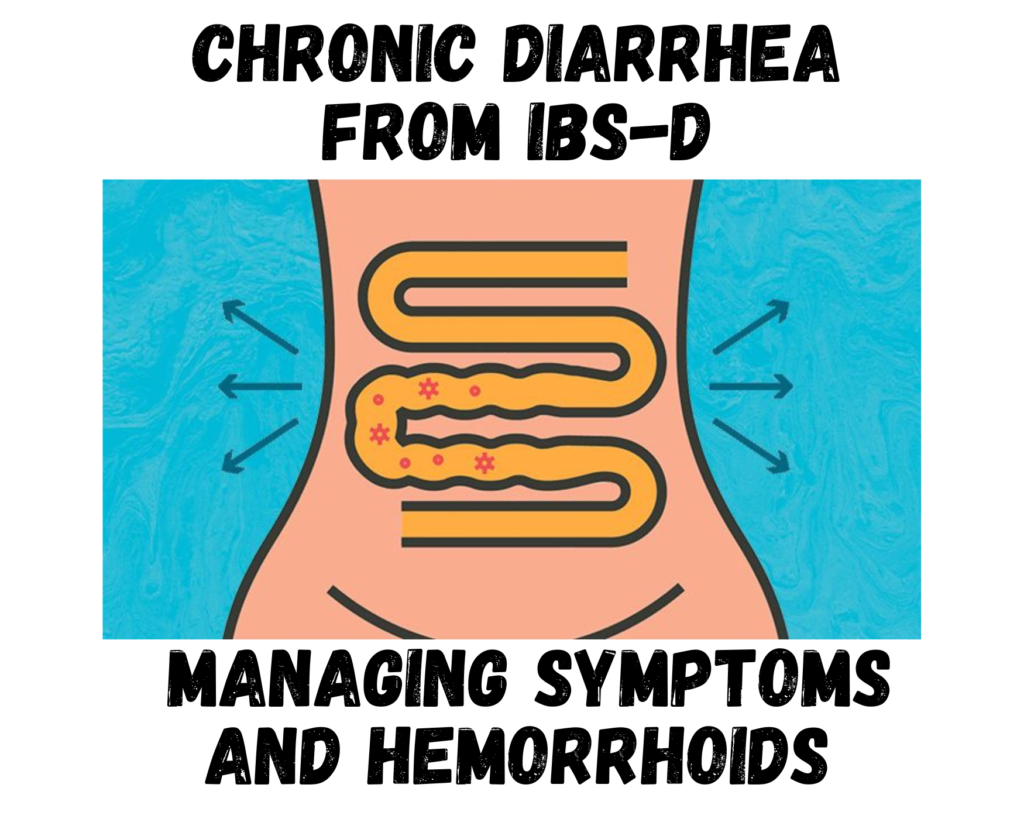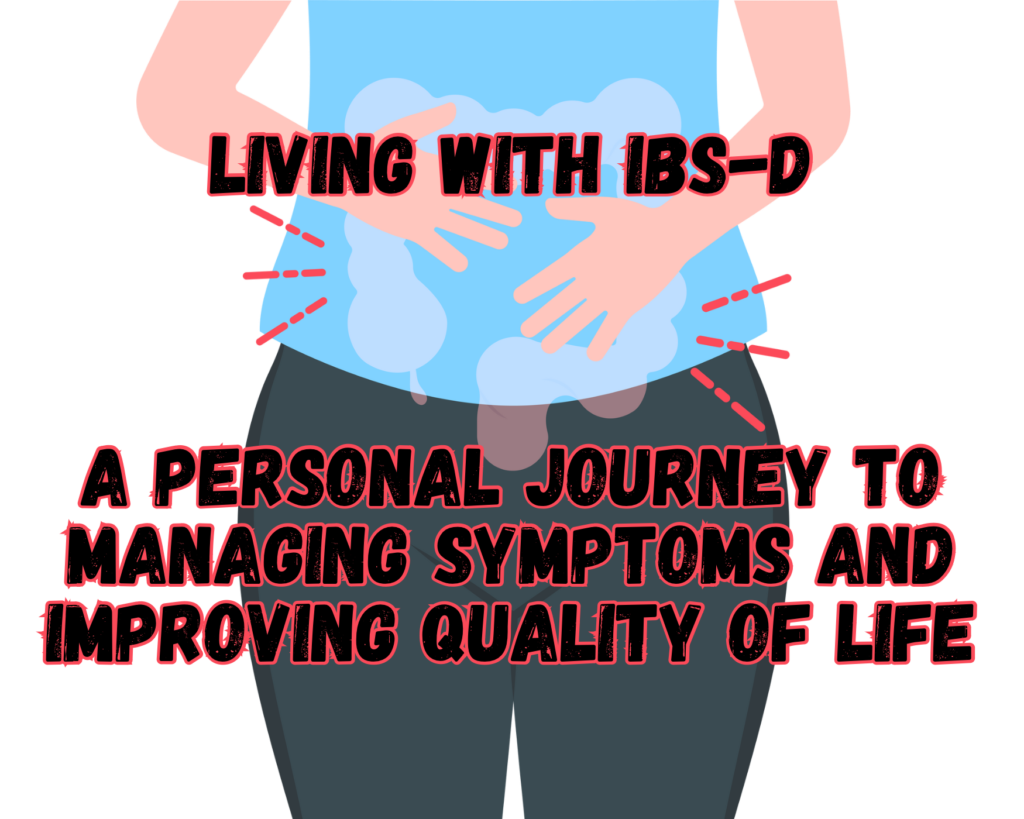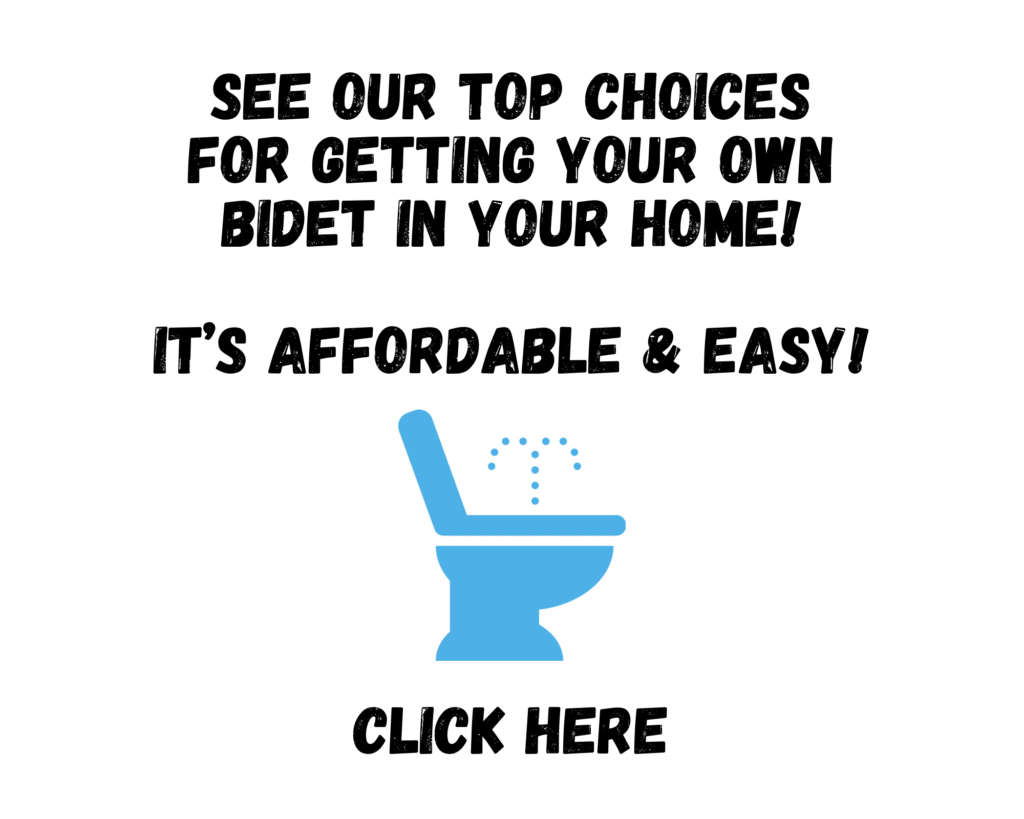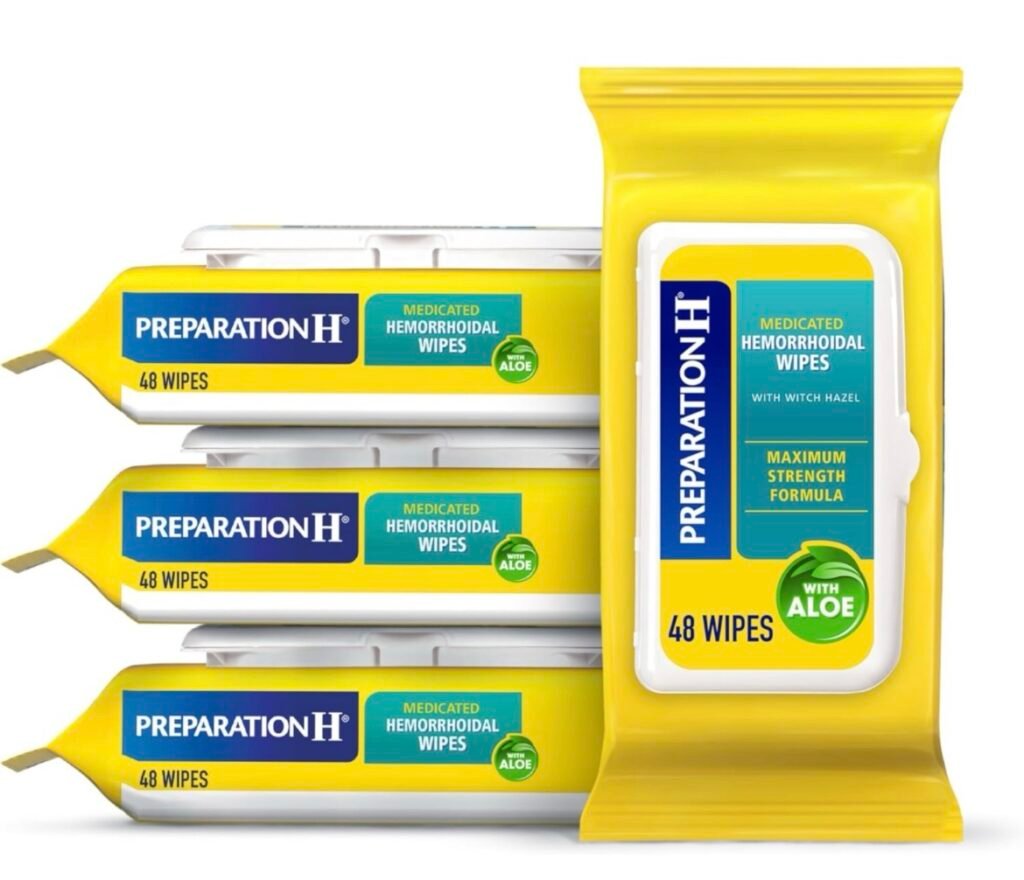Living with chronic diarrhea from IBS-D (Irritable Bowel Syndrome with Diarrhea) can be incredibly challenging, impacting nearly every aspect of daily life. The constant urgency, frequent trips to the bathroom, and the unpredictable nature of symptoms make it difficult to plan even simple activities. For many, including myself, the struggle doesn’t end there; chronic diarrhea often leads to complications like hemorrhoids, adding another layer of discomfort and frustration.

Understanding the Condition
IBS-D is a subtype of IBS characterized by chronic diarrhea, abdominal pain, and cramping. The exact cause of IBS-D is still not fully understood, but it often involves a combination of factors such as diet, stress, and gut sensitivity. Living with IBS-D means constantly managing these symptoms, which can vary from mild to debilitating on any given day.
For those dealing with both IBS-D and hemorrhoids, the combination of frequent bowel movements and straining can exacerbate the condition, leading to more severe symptoms like pain, irritation, and even bleeding. This is where effective management becomes crucial for improving quality of life and reducing discomfort.

The Importance of Management
Managing IBS-D and hemorrhoids is not just about finding temporary relief but also about implementing long-term strategies that can help control symptoms and prevent flare-ups. From dietary changes to lifestyle adjustments, there are several ways to take control of these conditions.
One tool that has been a lifesaver for me is the use of a bidet. By providing a gentle and thorough clean, bidets have significantly reduced the irritation and discomfort caused by traditional toilet paper, especially during flare-ups. This article will explore how bidets, along with other strategies, can offer significant relief for those living with IBS-D and hemorrhoids.
Whether you are newly diagnosed or have been navigating this condition for years, understanding the intricacies of IBS-D and its complications is the first step toward managing symptoms effectively. This article will provide insights into the causes, treatments, and practical tips for living with chronic diarrhea and hemorrhoids, offering a comprehensive guide to finding comfort and relief.
Ever wondered why your stomach hurts when you wake up? Find out here!

Understanding IBS-D and Chronic Diarrhea
Living with chronic diarrhea from IBS-D can be both physically and mentally exhausting. This condition not only affects your day-to-day activities but can also lead to further complications like hemorrhoids, which add an extra layer of discomfort to an already challenging situation. Understanding what IBS-D is and how it causes chronic diarrhea is crucial in managing this condition effectively.

What is IBS-D and How Does It Cause Chronic Diarrhea?
IBS-D, or Irritable Bowel Syndrome with Diarrhea, is a subtype of Irritable Bowel Syndrome characterized by recurrent abdominal pain and frequent diarrhea. The exact cause of IBS-D is not fully understood, but it is believed to result from a combination of factors:
- Gut Sensitivity: People with IBS-D often have a more sensitive digestive tract, which means that normal digestive processes can lead to pain and discomfort. This increased sensitivity can cause the intestines to contract more frequently or forcefully, leading to diarrhea.
- Dietary Triggers: Certain foods can trigger IBS-D symptoms. Common culprits include dairy products, caffeine, fatty foods, and artificial sweeteners. Each person may have different triggers, making it essential to identify and avoid foods that worsen symptoms.
- Stress and Emotional Factors: Stress and anxiety can exacerbate IBS-D symptoms. The gut-brain axis, which refers to the communication between your brain and digestive system, plays a significant role in this condition. Emotional stress can trigger the digestive tract to become more active, leading to diarrhea.
- Hormonal Changes: Some people notice that their IBS-D symptoms fluctuate with hormonal changes, such as those occurring during menstruation.

Connection Between IBS-D and Hemorrhoids
The frequent bowel movements and straining associated with IBS-D can lead to the development of hemorrhoids, which are swollen blood vessels in the lower rectum or anus. There are two types of hemorrhoids:
- Internal Hemorrhoids: Located inside the rectum, these hemorrhoids are usually not visible and are generally painless. However, they can cause bleeding during bowel movements.
- External Hemorrhoids: Located under the skin around the anus, external hemorrhoids can be painful and cause irritation, swelling, and bleeding.
Why IBS-D Causes Hemorrhoids:
- Frequent Bowel Movements: The increased frequency of bowel movements can cause irritation and pressure on the anal region, leading to hemorrhoids.
- Straining: Straining during bowel movements can increase pressure in the veins of the rectum and anus, contributing to the development of hemorrhoids.
- Irritation: The irritation caused by diarrhea can exacerbate hemorrhoid symptoms, making them more painful and uncomfortable.
My Personal Experience
As someone who has lived with IBS-D for years, I can attest to the connection between this condition and hemorrhoids. The frequent and urgent need to use the bathroom often results in straining, leading to painful external hemorrhoids. This makes managing IBS-D even more critical, as ignoring it can lead to complications that are even more challenging to deal with.
For a deeper dive into managing IBS-D symptoms and improving quality of life, check out this comprehensive guide on living with IBS-D. It provides valuable insights into how you can take control of your symptoms and live more comfortably with IBS-D.

Managing Hemorrhoids Caused by IBS-D
For those of us dealing with chronic diarrhea from IBS-D, hemorrhoids often become an unpleasant reality. These swollen blood vessels in the rectum or anus can cause significant discomfort, pain, and even bleeding, especially when irritated by frequent bowel movements. Managing hemorrhoids effectively requires a combination of lifestyle changes, dietary adjustments, and the use of soothing remedies.
Symptoms and Challenges of Hemorrhoids
Common Symptoms:
- Pain and Discomfort: Hemorrhoids can cause sharp pain and discomfort, especially during or after bowel movements.
- Bleeding: You might notice blood on the toilet paper or in the toilet bowl.
- Itching and Irritation: Hemorrhoids can cause a persistent itch and irritation around the anal area.
- Swelling: External hemorrhoids often lead to swelling around the anus, making sitting and walking uncomfortable.
Challenges:
- Irritation from Toilet Paper: Traditional toilet paper can exacerbate irritation and pain, especially for external hemorrhoids. The rough texture can make symptoms worse and cause bleeding.
- Frequent Bowel Movements: For those of us with IBS-D, the frequent trips to the bathroom mean that hemorrhoids are often in a constant state of irritation, making them harder to heal.

Lifestyle Changes to Manage IBS-D and Hemorrhoids
1. Dietary Adjustments
Adjusting your diet can have a significant impact on both IBS-D symptoms and hemorrhoid discomfort. Here are some dietary tips that have helped me manage these conditions:
- Increase Fiber Intake: A high-fiber diet helps soften stools and promotes regular bowel movements, reducing the need to strain. Include plenty of fruits, vegetables, and whole grains in your diet.
- Stay Hydrated: Drinking plenty of water aids digestion and prevents constipation, which can worsen hemorrhoids.
- Identify Food Triggers: Keep a food diary to identify and avoid foods that trigger your IBS-D symptoms. For me, dairy and high-fat foods are major triggers that I try to avoid.
- Anti-Inflammatory Foods: Incorporate anti-inflammatory foods like turmeric, ginger, and leafy greens to help reduce swelling and irritation.
For more tips on dietary changes that support stomach health, you can explore this comprehensive guide on stomach health.
2. Regular Exercise
Regular physical activity helps promote regular bowel movements and can alleviate the symptoms of both IBS-D and hemorrhoids. Activities like walking, swimming, and yoga can be particularly beneficial.
3. Manage Stress
Stress can exacerbate IBS-D symptoms, so finding effective ways to manage stress is essential. Consider practices like meditation, deep breathing exercises, and yoga to help keep stress levels in check.

Natural Remedies for Hemorrhoid Relief
While lifestyle changes are important, there are also several natural remedies that can provide relief from hemorrhoid symptoms:
1. Warm Sitz Baths
A warm sitz bath can soothe irritation and reduce swelling. Simply fill a bathtub with a few inches of warm water and soak the affected area for 15-20 minutes several times a day.
2. Witch Hazel
Witch hazel is a natural astringent that can help reduce swelling and provide relief from itching and irritation. Apply witch hazel directly to the hemorrhoid area using a cotton pad.
3. Aloe Vera
Aloe vera has soothing and anti-inflammatory properties that can help reduce the discomfort of hemorrhoids. Apply pure aloe vera gel to the affected area for relief.
4. Cold Compresses
Applying a cold compress to the affected area can help reduce swelling and numb the pain associated with hemorrhoids.
5. Over-the-Counter Creams
There are various creams and ointments available that can provide temporary relief from hemorrhoid symptoms. Look for products that contain hydrocortisone or lidocaine for pain relief.
Prevention Strategies
Preventing hemorrhoid flare-ups is an important part of managing IBS-D:
- Avoid Straining: Try not to strain during bowel movements, as this can worsen hemorrhoids.
- Use Gentle Products: Consider using wet wipes or bidets instead of toilet paper to reduce irritation.
- Don’t Delay Bowel Movements: Respond promptly to the urge to go to the bathroom to avoid straining.
For a more comfortable and hygienic bathroom experience, check out this article on why people choose to use a bidet.

The Role of Bidets in Managing IBS-D and Hemorrhoids
For those living with chronic diarrhea from IBS-D, a bidet can be a game-changer. As someone who has struggled with both IBS-D and hemorrhoids, I’ve found that using a bidet significantly enhances my comfort and hygiene, offering relief from the irritation that toilet paper can exacerbate.
How Bidets Help with Hemorrhoid Relief
1. Gentle Cleansing
Bidets offer a gentle and thorough clean that reduces the need for toilet paper. This is especially important for people with hemorrhoids, as the abrasive nature of toilet paper can irritate sensitive skin, cause pain, and worsen hemorrhoid symptoms.
- Less Irritation: The soothing water stream from a bidet minimizes irritation and reduces the risk of bleeding and discomfort. For external hemorrhoids, this gentle cleansing action can prevent flare-ups and promote healing.
- Better Hygiene: Using water instead of toilet paper provides a more hygienic cleaning experience, removing bacteria and reducing the risk of infection in the anal area.
2. Improved Comfort
For those dealing with frequent bowel movements due to IBS-D, the constant wiping with toilet paper can be painful and uncomfortable. A bidet offers a more comfortable alternative that reduces the friction and irritation caused by traditional cleaning methods.
- Pain Relief: The warm water from a bidet can soothe the burning sensation often associated with hemorrhoids and chronic diarrhea, providing instant relief.
- Temperature Control: Many bidets allow you to adjust the water temperature, providing a customized and comfortable experience tailored to your needs.
Personal Experience with Bidets
As someone who has experienced the discomfort of hemorrhoids and IBS-D, I can confidently say that installing bidets in my home has been a lifesaver. Before using a bidet, I often dreaded going to the bathroom, knowing that the toilet paper would exacerbate my symptoms and leave me feeling raw and sore. With a bidet, I’ve found a solution that not only eases my symptoms but also significantly improves my quality of life.
- Daily Relief: Having a bidet in my bathroom means I no longer have to worry about the pain and irritation that come with frequent bowel movements. It’s a small change that has made a huge difference in my day-to-day comfort.
- Confidence: Knowing that I have a reliable and comfortable way to maintain my hygiene gives me confidence and peace of mind, especially on days when my symptoms are at their worst.
If you’re considering investing in a bidet, I recommend checking out my article on the best bidets for comfort and cleanliness. It covers various models that cater to different needs, ensuring you find the perfect match for your bathroom.
Choosing the Right Bidet for Hemorrhoids and IBS-D
When selecting a bidet, it’s important to consider features that cater specifically to individuals with IBS-D and hemorrhoids:
- Adjustable Pressure: Look for a bidet with adjustable water pressure to ensure a gentle cleanse without causing discomfort.
- Temperature Control: A bidet with temperature control allows you to choose a warm water setting, which can be soothing for irritated skin.
- Easy Installation: Some bidets are easy to install and can be attached to your existing toilet, making them convenient for home use.
- Air Drying Feature: Bidets with built-in air dryers eliminate the need for toilet paper altogether, providing an additional layer of comfort.
For those interested in learning more about why bidets are a beneficial addition to any bathroom, read this article on why people choose to use a bidet.

Practical Tips for Living with IBS-D and Hemorrhoids
Living with chronic diarrhea from IBS-D and hemorrhoids requires careful planning and proactive management to maintain comfort and quality of life. Here are some practical tips and daily habits that can help you manage these conditions more effectively.
Daily Habits for Comfort and Relief
- Use Moist Wipes or Bidets
Traditional toilet paper can aggravate hemorrhoids, so consider using moist wipes or a bidet for a gentler, more thorough clean. Bidets, in particular, can provide soothing relief and improve hygiene, reducing irritation and the risk of infection. - Wear Comfortable Clothing
Choose loose-fitting, breathable clothing to reduce pressure on the anal area and avoid further irritation. Cotton underwear is preferable, as it allows the skin to breathe and prevents moisture buildup, which can aggravate hemorrhoids. - Maintain Regular Bowel Habits
Establishing a routine for bowel movements can help manage IBS-D symptoms. Try to use the bathroom at the same time every day, and avoid delaying the urge to go, as this can lead to straining and worsen hemorrhoids. - Stay Hydrated
Drink plenty of water throughout the day to keep stools soft and prevent constipation, which can aggravate hemorrhoids. Staying hydrated also helps the digestive system function more efficiently. - Apply Soothing Creams
Use over-the-counter creams or ointments containing hydrocortisone or witch hazel to relieve itching and discomfort. These products can provide temporary relief and promote healing.

Traveling with IBS-D and Hemorrhoids
Traveling with IBS-D and hemorrhoids can be daunting, but with careful planning and preparation, it can be more manageable. Here are some strategies for staying comfortable while on the go:
- Plan Ahead
Research your travel route and identify rest stops and bathroom locations in advance. Knowing where you can find a restroom can ease anxiety and make the journey more comfortable. - Pack Essentials
Carry a travel kit with essentials like moist wipes, soothing creams, and any medications you may need. Having these items on hand can help you manage symptoms quickly and discreetly. - Choose Safe Foods
Stick to familiar foods that you know won’t trigger your IBS-D symptoms. Avoid trying new or spicy foods while traveling, as they can lead to flare-ups. - Stay Calm
Stress can worsen IBS-D symptoms, so practice relaxation techniques like deep breathing or meditation to keep calm during your trip. Staying relaxed can help you manage symptoms more effectively. - Stay Hydrated
Keep a water bottle with you at all times to ensure you stay hydrated, especially if you’re flying or traveling in hot weather. Proper hydration helps maintain regular bowel movements and prevents constipation.

Importance of Mental and Emotional Well-being
Living with IBS-D and hemorrhoids can take a toll on mental and emotional well-being. It’s important to prioritize self-care and seek support when needed. Here are some strategies for maintaining mental health:
- Build a Support System
Connect with friends, family, or support groups who understand your condition and can offer encouragement and empathy. Sharing experiences with others who face similar challenges can reduce feelings of isolation. - Practice Stress-Relief Techniques
Incorporate stress-relief techniques like yoga, meditation, or deep breathing exercises into your daily routine. These practices can help you manage stress and improve overall well-being. - Seek Professional Help
Consider working with a therapist or counselor to address the emotional challenges of living with chronic conditions. Cognitive-behavioral therapy (CBT) can be particularly effective in managing anxiety and depression associated with IBS-D and hemorrhoids. - Embrace Self-Compassion
Be kind to yourself and recognize that managing these conditions is a journey. Allow yourself to have bad days without judgment, and celebrate small victories along the way.

Living with chronic diarrhea from IBS-D and managing hemorrhoids can be a difficult and often frustrating experience. However, by understanding the nature of these conditions and implementing effective strategies, it’s possible to improve your quality of life and reduce the discomfort that comes with these challenges.
Recap of Key Points
- Understanding IBS-D and Hemorrhoids: Recognizing how IBS-D can lead to chronic diarrhea and the development of hemorrhoids is crucial for effective management. By identifying triggers and understanding the relationship between these conditions, you can take proactive steps to manage symptoms.
- Adopting Lifestyle Changes: Simple lifestyle adjustments, such as incorporating a high-fiber diet, staying hydrated, and engaging in regular exercise, can have a significant impact on managing both IBS-D and hemorrhoids. These changes help improve digestion, reduce irritation, and promote overall well-being.
- Utilizing Bidets for Relief: The use of a bidet provides gentle and effective cleaning, reducing irritation from hemorrhoids and offering relief from frequent bathroom trips. Bidets have become an essential tool for many, providing comfort and hygiene when traditional toilet paper falls short.
- Emphasizing Mental and Emotional Well-being: Managing IBS-D and hemorrhoids is not only about physical care but also about maintaining mental and emotional health. Building a support system, practicing stress-relief techniques, and embracing self-compassion are vital components of a holistic management approach.
- Preparing for Travel: Traveling with IBS-D and hemorrhoids requires careful planning and preparation, but with the right strategies, it can be a more manageable experience. Packing essentials, choosing safe foods, and practicing relaxation techniques help ensure a comfortable journey.
Encouragement for you!
For anyone living with IBS-D and hemorrhoids, remember that you are not alone in this journey. It’s important to remain patient with yourself and acknowledge that managing these conditions is a learning process. Each step you take towards understanding and managing your symptoms brings you closer to finding relief and improving your quality of life.
Explore More Resources:
- For a deeper understanding of managing IBS-D, check out this comprehensive guide.
- Discover the benefits of using a bidet and how it can enhance comfort and hygiene in this detailed article.
- Learn more about selecting the best bidets for comfort and cleanliness here.

Final Thoughts For Today
Living with chronic diarrhea from IBS-D and hemorrhoids can feel overwhelming, but with the right tools and support, it’s possible to find comfort and relief. By embracing a proactive approach to managing your symptoms and utilizing the resources available, you can navigate these challenges with confidence and resilience.
Always consult with healthcare professionals for personalized advice and treatment options that suit your specific needs. With determination and the right strategies, you can take control of your health and lead a fulfilling life despite the challenges posed by IBS-D and hemorrhoids.
As an Amazon Associate we earn from qualifying purchases through some links in our articles.



